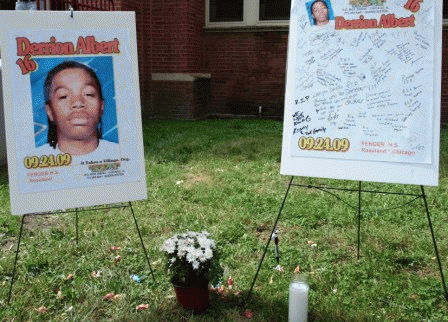Snitching can get you killed.
That much I understood growing up in the Ă ??hood. In kindergarten, I was taught not be a tattletale. But to tell on bad guys, on the criminally minded, especially those who breathe bloody murder, is a more serious matter than being a little, tattling toddler.
Lately here, particularly in light of the senseless violence that continues to claim innocent lives in Chicago, I have heard the lambasting of the good people of terrorized neighborhoods for not readily coming forward with information on murders. I have seen some shaking their heads, shoulder shrugging, and essentially blaming those unwillingĂ ??at least reluctantĂ ??to tell, as being in some way complicit.
Some even seem roiled that someone might witness a murder and be reluctant to come forward to police. And, in fact, they convey the sense that those unwilling to be witnesses are somehow less human, less feeling and less willing to assume responsibility, less eager to play a role in helping turn their neighborhoods around.
In my experience of growing up in an impoverished Chicago community like those under siege, it boils down to an issue of trust. And many who live in the city's most murderous neighborhoodsĂ ??who have also witnessed police and political corruption and a trail of broken promisesĂ ??simply don't trust the authorities enough to come forward and by doing so, potentially laying their lives on the line.
It isn't that people don't want to tell. They do. And it isn't the case that they aren't concerned about their neighborhoods. They are. Nor is it simply a matter of fear, but the fact that to come forward is to risk everything, even in a world where Ă ??safetyĂ ? ť is always relative.
In poor black neighborhoods, we have seen the revolving door of criminal justice. We have come to understand that there is a new breed of serial killerĂ ??young men who kill and kill and kill again. And we also know this: That when the feds seek witnesses in high-profile cases to bring down notorious mobsters and crime families, they at least have the good sense to offer witness protection. They understand what's at risk for those who come forward. They also recognize the compelling need to end the scourge of America's most dangerous.
In my old West Side neighborhood, Ă ??body snatchersĂ ? ť are real. There, I have known of masked gunmen to creep upon their prey in the still of night as they sit on a porch unsuspectingly, to kick in doors and hold people at gunpoint, or else to kidnap, maim and murder. They have come for a known gang leader in broad daylight, stuffed him in the trunk of a car while bodyguards watched helplessly. From a child, I have witnessed gunplay and gangs and drug dealers and pimps in shiny Cadillacs, glaring like the sun, and the police drive by street cornersĂ ??where hustlers hawk their waresĂ ??and do nothing.
The LawĂ ??the policeĂ ??in certain neighborhoods isn't necessarily the law. Once the flashing white-and-blues disappear, we who were left behind understood that we were then at the mercy of the lawless or at least left to protect ourselves by any means necessary.
For some, our insurance was God. For others, it was the gun. For others still, a little bit of both. But seldom did we consider the police.
Would someone who gave vital information to police stand more to gain, or more to lose? And if the bad guys should come for them, masked and under the cover of night, who of us could they then call? Would the cavalry arrive too late, if at all?
And, as in the recent beating death of 16-year-old Derrion Albert, if it was the case, as some students have alleged, that a police squad car arrived at the scene during the melee, though no officers intervened to save Derrion, what measure of protection can anyone who witnessed it expect they might receive as a Ă ??snitchĂ ? ť?
Given the historic marginalization of black and brown lifeĂ ??and deathĂ ??why would one think that losing their life for having been brave enough to speak out might somehow make the difference? Why wouldn't they simply become like the scores of murder victims whose names week in and week out don't even make the newspaper's police blotter?
And yet, I have heard themĂ ??politicians, police and punditsĂ ??reviling the people of these neighborhoods for not coming forward. And I think to myself, Ă ??Easy for them to say. Let them lay aside their bodyguards, their chauffeur-driven limousines and their legal sidearm, and let's see just how brave they'd be.' Instead we all leave the Ă ??hood and go safely home.
Whenever gunfire thundered in the night in my old neighborhood, I was always grateful when the scene was blocks away, relieved that any blood spilled had not come nigh my front door. Except in a way, I always realized it was never that far away. That every evil that happened in my neighborhood, in one sense or another, always happened to us all.
(Note: You can view every article as one long page if you sign up as an Advocate Member, or higher).





